Updated July 2024.
When you’re already working hard to grow your blog, the notion of spending time writing posts for another website may seem counterproductive. And yet, in the ever-evolving digital marketing landscape, guest posting (or guest blogging) remains a trusted technique for marketers and bloggers.
So why is guest posting so effective? And, more to the point, how do you unlock the real power of guest blogging?
In this article (which is a guest post!), we will discover the secrets of successful guest blogging so you can learn how to grow your brand or business with a guest post strategy.
TABLE OF CONTENTS:
What Is Guest Blogging?
Guest blogging is as simple as it sounds: a piece of content contributed to a blog by a guest writer.
Also known as guest posting, this is a strategy where an individual has a blog post they’ve written published on a third-party website. This method is commonly used to promote one’s personal or corporate brand.
By contributing content to other websites, these individuals gain exposure to new audiences, enhance their reputation within their industry, and potentially create valuable backlinks to their own website, which can support their site’s SEO efforts.
And guest blogging is beneficial for both the guest blogger and the host site, because it offers fresh content and perspectives to the host’s audience.
6 Key Benefits of Guest Posting
Anyone who’s written a quality article knows that it takes time to do it right. So why should you bother pouring your valuable time into writing a wonderful article for someone else’s blog?
You may think that it’s best to focus on creating content for your own website rather than wasting time growing someone else’s blog, but you can make a much more significant impact by posting on established blogs and see some tremendous benefits.
Here are six huge benefits of embracing this powerful content marketing strategy.
1) Guest Blogging Builds Relationships in Your Niche
Especially if you’re new to the scene, guest posting will help you build relationships with bloggers and brands. Most will gladly accept a free high-quality guest post from an outsider, without any additional requirements.
Single Grain has a guest post submission button right on their blog:

So why would a company accept guest posts from unknown writers? Because it means they get excellent content for their blogs at no cost in time or money to them, which is particularly helpful for them if they’re a small-team organizatioin.
Reaching out to inquire about guest posting gives you a unique opportunity to make new connections in your online world.
Of course, not all these contacts will prove to be positive. However, by taking a proactive and professional approach to pitching fellow bloggers and brands in your niche, you will start to get your name (and talent for writing) out there, building credibility and an impressive portfolio for you.
2) Guest Blogging Increases Brand Awareness
Guest posting will help your blog rank better in search engines. In a word, collaborating with websites in your niche enables you to weave links back to your own blog or site within the articles you publish on their platforms. The strategic placement of these relevant backlinks is pivotal in enhancing your blog’s visibility on search engines.

Most websites hosting guest posts typically allow the inclusion of at least one link within the article and another in the author bio, making it feasible to create these essential connections back to your site. As you progressively guest post across a diverse array of sites, your reach exponentially grows, tapping into the potential of connecting with hundreds, if not thousands, of new followers.
And this expanded reach goes beyond the host. Each guest post shared to social media by the host site further spreads your personal or corporate brand’s presence and visibility. This cascading effect can significantly elevate your brand’s profile, drawing more attention to your content and establishing your authority in your niche.
This approach not only boosts your SEO but also cements your standing in the digital space, making your brand a recognizable name across various platforms and audiences.
3) Guest Blogging Opens the Door to New Audiences
The beauty of guest posting is that you can control the audience you present yourself in front of. It’s up to you to decide which brands you want to partner with, meaning that to some extent, you can dictate the type of referral traffic that trickles onto your own site.
Where this gets more specific is finding the common ground in blogging for a host site’s audience that may not be the same as your own, but, rather, an industry-adjacent audience. For instance, marketing agency A predominantly focuses on SEO-related content for their blog, therefore attracting a lot of readers interested in SEO tips and strategy.
Then comes along marketing agency B which focuses on PPC-related blog content and wants to contribute a piece on marketing agency A’s blog to access more readers normally interested in SEO.
Since PPC and SEO share many things in common, agency B sees the audience intent overlap and potential readership growth if they can appeal to agency A’s audience with guest content that bridges the gap between SEO and PPC.

This type of scenario can apply to practically any brand that has affiliations with a complementary industry.
After all, the intent is to access a new audience that is already predisposed to engaging with your content. You just have to deliver content that also appeals to the audience of the blog owner.
4) Guest Blogging Establishes Your Authority and Credibility
On your own website, you are the chief everything officer. However, it takes a long time and a lot of effort to build a blog from scratch and make it a recognized fountain of knowledge and wisdom.
When you produce well-written, properly researched, authoritative guest posts on reputable websites for established brands, you get the chance to offer unique insights in a fresh voice that resonates with your readers. This works wonders for your own reputation. People who enjoy the post will likely click on your author’s bio and visit your site, curious to discover more about you and your work. This then sparks a new relationship with those users and your brand:
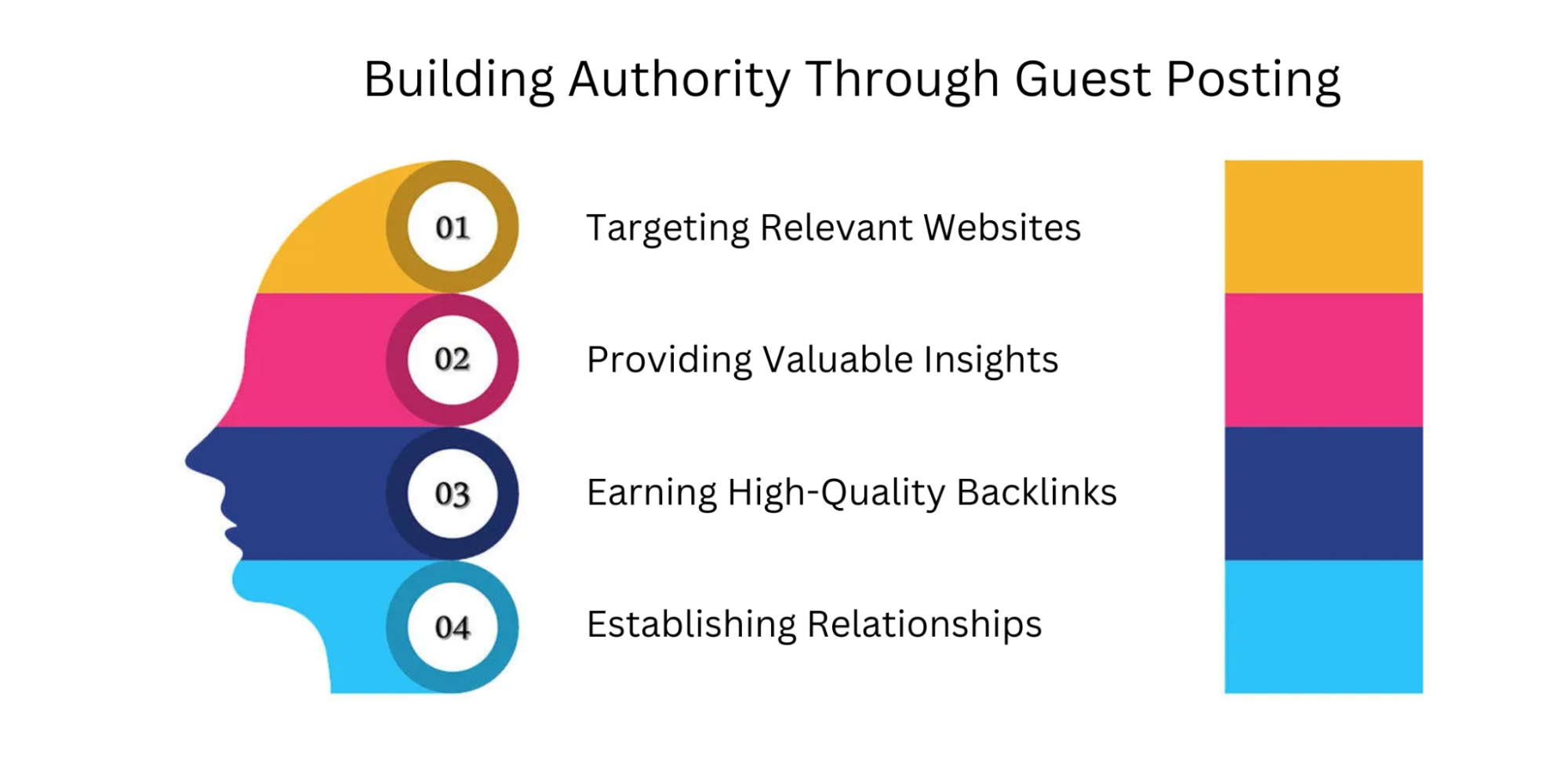
By publishing guest posts on major authority websites in your niche, you’ll quickly create an aura around your name and brand, earning the respect of more people in your audience.
5) Guest Blogging Generates Leads
Content marketing is a fickle beast that has the power to drive sales or drain company budgets. When you distribute high-quality content through multiple channels, using popular blogs and established platforms, you nurture trust with your target audience.
Furthermore, you also build brand recognition as people become familiar with your content and see you as an expert in the field. This has a significant impact on your sales funnel:

In effect, the more authority you build, the easier it will be to get prospects to trust your brand and be more open to your products or services. As such, you effectively shorten the sales cycle.
Think of it as if you’re using the host site (the site you’re guest posting on) as a staging area for leads in your pipeline. It’s like you’re borrowing space on their site to promote your brand and drive traffic with buying intent.
Instead of waiting for leads to find your site or reaching out to them directly (outbound marketing), you can use guest posting as part of your inbound marketing strategy. Guest posts on trusted sites give you a stage to present your brand message and value propositions, which expedites the customer journey for your products and services.
6) Guest Blogging Improves SEO Through Backlinks
Search engines love it when a site is referred to by other high-quality websites. It’s the whole reason why procuring backlinks became a thing.
One of the main objects of guest blogging is the acquisition of said backlinks. When a host site invites a guest onto their site to contribute a piece of content, there is usually an arrangement that allows at least one link back to the guest poster’s domain.
Naturally, this is a great outcome for the guest poster because it’s one of the most genuine ways that a domain can generate backlinks, thereby enforcing the authority of the guest poster’s website.
In the case of one Twitter poll, the people surveyed largely agreed that the main reason they do guest posts is to acquire links:
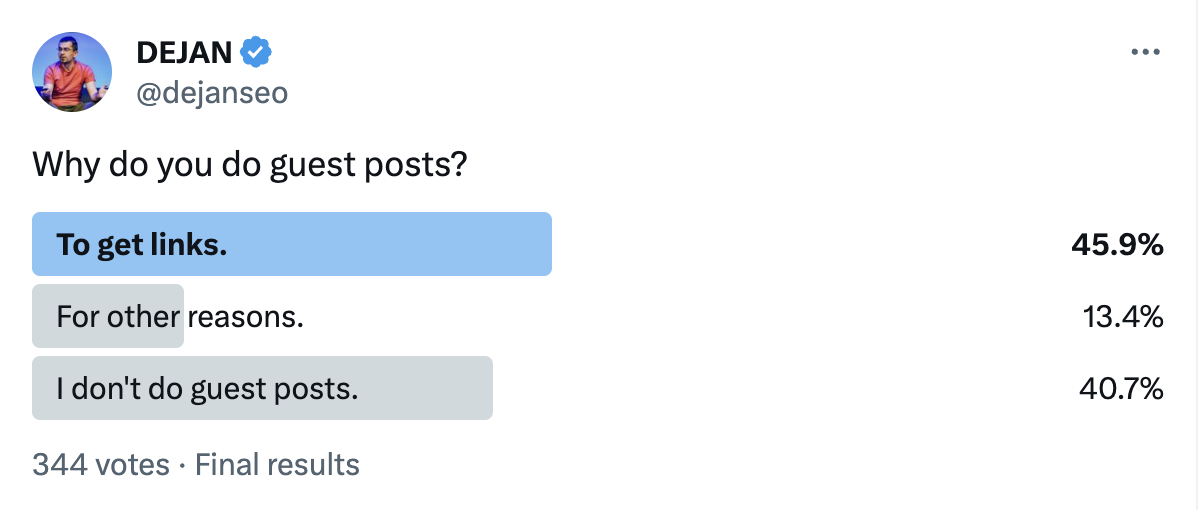
Of course, there are plenty of other ways to get backlinks, but guest posting is quite easily one of the most collaborative methods of getting more referring domains to point back to your brand.
Learn More: Google Core Update March 2024: What Content Creators Need to Know
How to Prepare for Guest Blogging
Imagine that you open a new shop. You hand out flyers that advertise a sale this weekend, but when people show up, you aren’t ready. There’s no stock on the shelves yet and you’re still painting the walls.
Immediately, people will walk away with a poor first impression — and probably not come back. Why should they? They aren’t sure what your business is about and they find nothing of interest to make them want to return.
Guest posting is a bit like handing out flyers, in that it involves some grassroots hustling. But similar to the flyers, you need to make sure that you’re ready for the attention.
It’s not enough to just start guest posting in different places. Even though the partnership with the site owner might be a match made in heaven, you have to be ready to handle a bump in traffic (and subsequently inquiries or sales).
Before you reach out and start creating your guest posts, here are a few things that you should do.
Set Goals for Your Guest Posts
Just like any other type of marketing content, you ought to have a clear set of goals behind your guest blogging strategy. What is it that you aim to achieve in writing them?
Even if it’s for something as simple as networking and building professional relationships, it’s important that you define why you’re doing what you’re doing with each guest article.
While all of the six benefits we mentioned above are reasons why you would want to participate in guest posting, here are some things to shoot for to obtain those benefits:
- Increase Website Traffic: Look at the ways you’re currently driving traffic to your site and use that as a benchmark to gauge the progress of your guest blog posts and the results they produce.
- Generate Quality Backlinks: Writing guest posts for someone else’s website and accepting guest posts are both ripe with opportunities for link building. Aim to acquire backlinks from authoritative sites to improve your website’s search engine ranking. You can measure the success of your guest post opportunities by taking a look at your site traffic in Google Analytics and the referring domains that led traffic to your site from the guest post.
- Drive Conversions: Write your guest post with a call-to-action that directs readers to take specific actions, such as signing up for newsletters or downloading resources you offer. This is another metric you can attribute back to the host site. Set a hard number of leads you want to gain from guest posts that will reward the effort you put into the guest post content.
Get Your Blog Up and Running
In addition to setting goals for your guest blogging strategy, you’ll need to make sure you have an excellent place for your readers to find out more about you once they click through from the guest post. That means making sure your website is up and running.
First, design a personal blog that looks professional. There are several online website building tools to help you with this part, even if you are not a designer:

Start with a professional logo, the main header, and then your pages. You don’t need tons of pages, just a few like a homepage, an “About” page, a portfolio of your work, and a “Contact” page.
Optimize your web pages to load fast, and make sure that your site looks great so that you offer a user experience that site visitors will remember. Keep in mind that even a one-second delay in page load time yields:
- 11% fewer page views
- 16% decrease in customer satisfaction
- 7% loss in conversions
Most importantly, define your niche. While you can become an influencer with a general blog, it’s much better to focus on a particular topic — and make it obvious on your home page above the fold. By honing in on a smaller but more targeted audience, you can make yourself the expert there, and engage people at a deeper level.
Build Your Social Network
Once you have a great-looking site and blog, you’ll need to build up a strong presence on social media. This is essential.
An estimated 95.9% of guest bloggers promote their blog posts on social media platforms. Since most social platforms have millions of daily active users, your potential for a large number of eyes on your work is huge.
Don’t worry about attacking them all. Rather, create detailed profiles with a link to your site on one or two of the most relevant (for you) platforms. Aside from promoting your posts, you can use these channels to interact with your audience and build connections with fellow guest bloggers and companies in your market space.
Create an Author Bio
And, of course, before you start writing any guest posts, create a solid author bio. Wherever you get a guest post published, the host site’s editor will ask you for your author bio (and if you don’t provide one, you’ll get an anonymous silhouette avatar and a blank space next to your name).
Put yourself in the readers’ shoes and think about the light in which you want people to see you. A great bio should be short, sweet and to the point, providing enough information to underline your authority and expertise, and also encouraging people to come and discover more.

Set Up Tracking with Google Analytics
Lastly, it’s a good idea to set up tracking on your website so you can gauge the impact that your guest posting has on your regular traffic. This is even more critical when you want to build brand awareness and acquire new leads. Google Analytics tracking will give you the information you need about new site visitors.
Writing an Effective Pitch for Guest Blogging
The moment you’ve found one or more potential host sites that you really click with, it’s time to craft your pitch. Much like any job application, you want to present who you are, what you’re good at and how you can add value to your prospect as succinctly as possible.
People read their emails, but most of the time, they skim them. So if you send them a novel disguised as an email, they’re not going to engage with your pitch. Try to keep your pitch to 200 words or less. The shorter, the better. But you want to maintain a sufficient amount of information to help your prospect realize that you’re credible and have something they might want.
Here’s four components that make up a masterclass guest post pitch:
1) Demonstrate Familiarity
Show that you’re familiar with their blog by mentioning a few posts you found particularly impactful. This will make the difference in proving to the prospect that you’re not using some generic guest post pitch template. Call out something specific about their brand, product, or service that resonates with you.
Once they realize you’re not a total stranger and that you actually know a thing or two about them, they’ll feel more inclined to talk to you since they won’t have to explain themselves from scratch. They’ll also feel endeared to your pitch for the sake that you reached out knowing exactly who they are and what they do.
2) Propose a Few Topics
Offer two or three well-thought-out topics that would fit their blog. Make sure these topics are unique and haven’t been covered extensively on their site.
When presenting your ideas, try to focus on topics that are progressive developments in the industry you and your prospect are in. This will show them you’ve got your finger on the pulse of what’s new and evolving in your field.
If you suggest a post called “How to Create an SEO Strategy,” they likely won’t read past that because it doesn’t offer anything new, different or interesting. If, however, you suggest “How to Rank Your Brand-New Website When You Don’t Know SEO,” there’s a much better chance of piquing their interest:
3) Explain Why Your Post Will Add Value
Piggybacking off new and evolving trends, you want to position yourself as having close, intimate knowledge of what’s up and coming. Affirm the prospect of their desire to be at the forefront of their industry and that the guest post idea you have will help them pioneer it further.
Back to the job application analogy, the same applies here is it does to a potential new employer. You want to convince them that you can help them as much as your guest post on their site can help you.
Detail why your proposed topic(s) will be beneficial for their audience. Explain what makes your perspective or information unique and fresh.
4) Include Samples of Your Work
Lastly, provide about three links to previous guest posts or articles you’ve written, especially those that have performed well and/or that have been published on well-known sites. A solid reference source will help back up all of the claims you make about your expertise and the ideas you have for valuable content for the host site.
Here are two samples of guest pitches to get your creative juices flowing.
Guest post pitch #1:
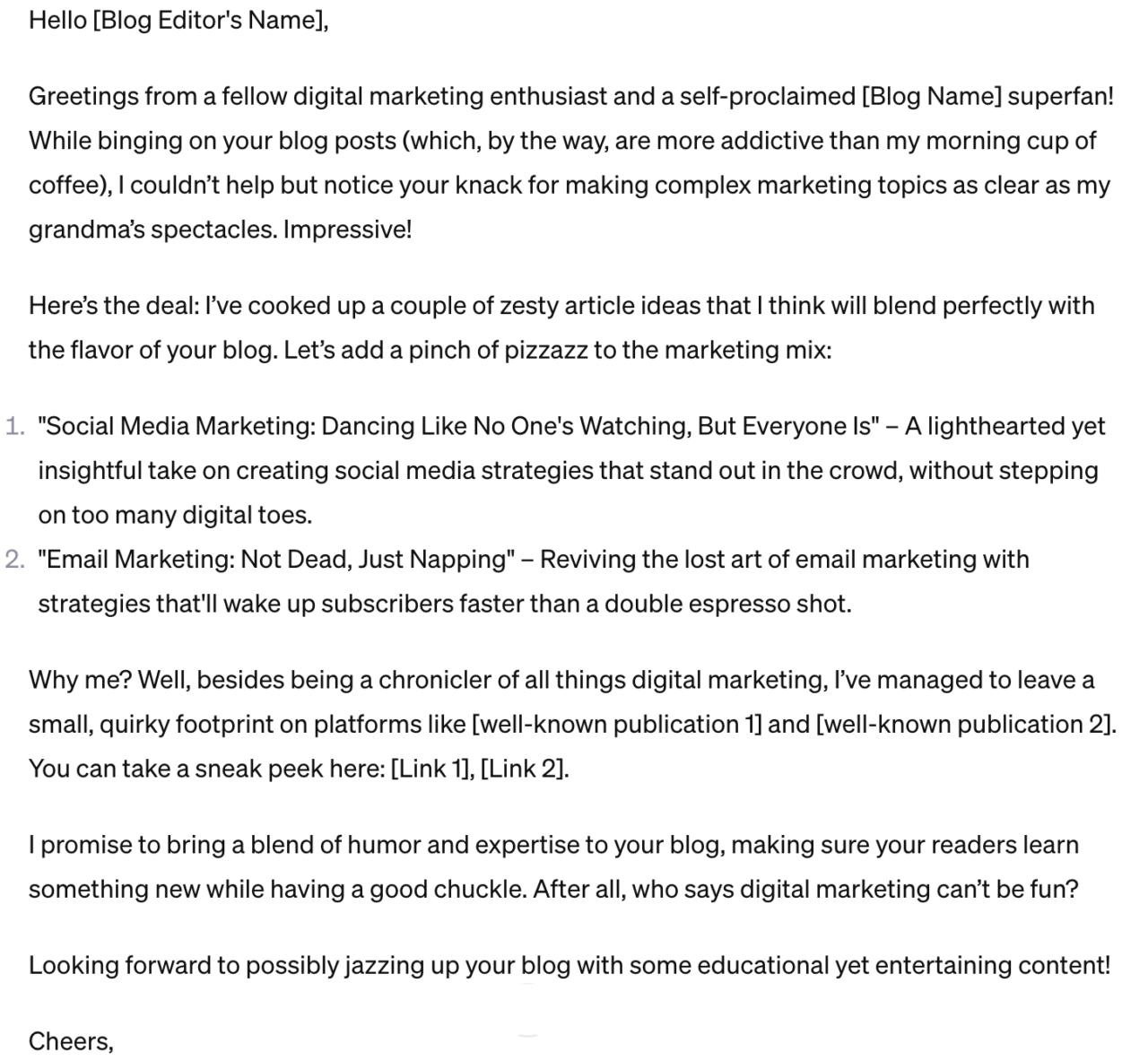
Guest post pitch #2:

How to Find Sites that Accept Guest Posts
Now that you’ve written a fantastic guest post that is just itching to be published on a high-authority site, it’s time to find those sites.
Here are a few methods you can use to find suitable sites that accept guest posts:
Relevant Bloggers in Your Niche
If you’ve got a good social media game, you’ll probably have a bunch of fellow bloggers among your followers. Many of these may have bigger audiences than you, and some may even be at the influencer level.
You can get on their radar by sharing their posts and interacting on comment threads with useful insights and contributions to the conversation. Then you can try politely asking if they know of any sites that are accepting guest posts in your niche.
Google Search
This is a simple method that can yield great results. Try doing a Google search for relevant keywords related to your niche. For example, you could search “guest post e-commerce” or “video marketing guest posts”. You can also search for “write for us”.
Another idea is to search where your favorite bloggers are guest posting. Search for “guest post by [blogger’s name]” to find other websites where they have published work.
You can also try the following search patterns to find the correct page(s) for guest post submissions on specific websites (replace “domain_name.com” with a specific website domain like “singlegrain.com”):
- site:domain_name.com “submit guest post”
- site:domain_name.com “guest post by”
- site:domain_name.com “submit your post”
- site:domain_name.com “become a contributor”
- site:domain_name.com “guest author”
- site:domain_name.com “write for us”
And, finally, try punching this into Google: “list of sites that accept guest posts”:
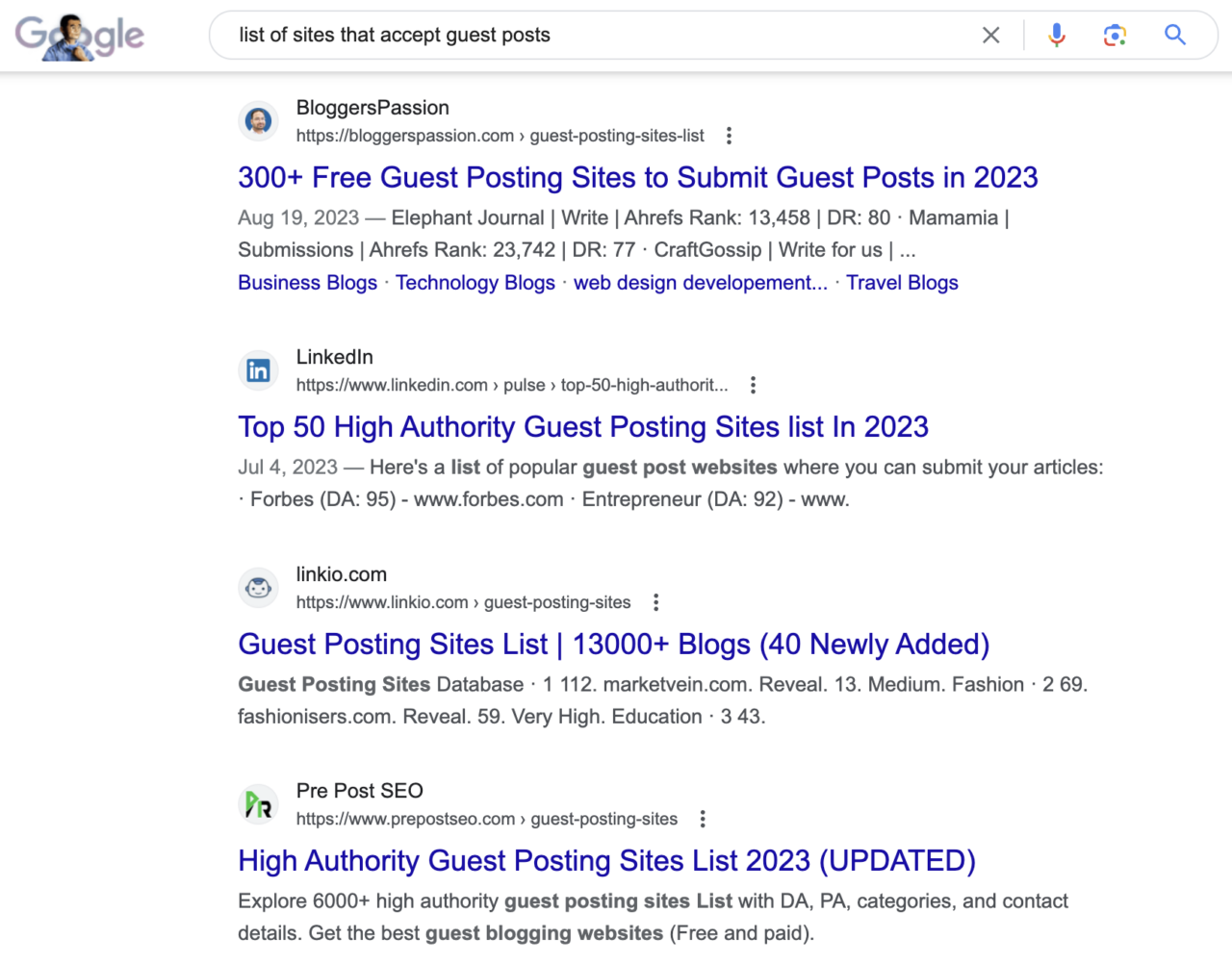
Hunter.io
You can also make use of the Hunter.io Chrome extension, which you can use to scan websites for content manager roles at a company. From there, you can reach out to them directly to inquire about the potential for posting guest content on their blog:

In some cases, you’ll want to do this if the prospect isn’t outwardly advertising that they want guest posters. Even if that is the case, it can still be worth a shot. Anyone can change their mind about blog posting if they discover the right voice that can contribute genuinely good content to their blog.
You may even be the first person who convinces your host site to start seeking more guest posters in the future, if it turns out well for them.
Read Their Submission Guidelines
Now that you’ve compiled your list of target sites, it’s time to make your pitch. Follow the blog’s guest post guidelines on each site to ensure that you get off on the right foot with your prospect.
It might seem obvious, but neglecting guest posting guidelines can create tonal dissonance on the blog owner’s site to the point where it disturbs the rhythm frequent readers are used to. Not only that, but you’re very likely to just annoy the content manager or editor. They wrote their guidelines for a reason.
For example, this is the list of guidelines Single Grain expects of any new guest writer:

Writing the Guest Post
Guest posting can be a tricky endeavor, as you may find yourself writing for a different audience and possibly in a completely different industry! Whatever you create not only has to be a good representation of your brand and skills, but also of interest to the host’s audience.
Here are four crucial components of a quality guest post. Make sure you check all these boxes before sending your guest blog post to anyone!
1) Offer Unique Insight
For years there has been a lot of talk about the need for “great content” or “high-quality writing.” But what exactly does that mean?
Quality content boils down to the insight that you offer readers. There are thousands of bloggers online who are using online marketing strategies focused on content to build their personal brands, so to have any chance of standing out, you must create something unique, useful and beautifully crafted:

But with all the articles out there, how can you say something new? How can you help the audience as nobody has before? Use the Skyscraper Technique, a term coined by Brian Dean of Backlinko, that can be broken down into three simple steps:
- Find link-worthy, relevant content
- Create something better
- Share what you’ve written
Finding popular content is easy with tools like BuzzSumo, a site that lists published content with the highest social shares, perfect for building your skyscraper article from. Then you analyze the top performers to see what is missing or outdated from these posts and figure out how you can improve upon it (not copy it or steal it — improve it).
2) Create Valuable Content with Actionable Takeaways
Google evaluates the user experience in part by looking at who wrote the web content and assessing whether the writer is an expert content creator. You wouldn’t want to read an article about how to sue your landlord by a writer with zero legal experience.
So to ensure that your content is high quality, follow Google’s E-E-A-T principle: Experience, Expertise, Authority, and Trustworthiness:
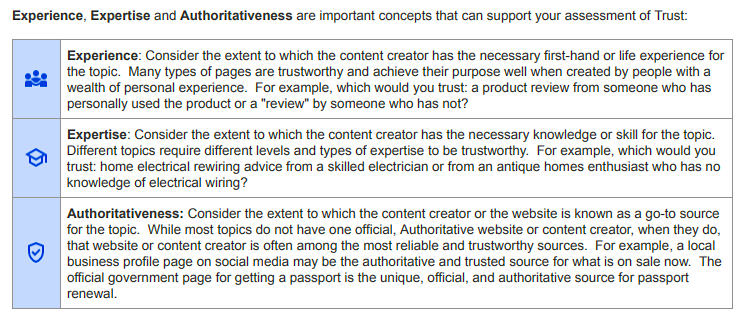
You’ll only achieve your goals if you can deliver valuable content that has actionable takeaways. If you do that, people will enjoy your blog post enough that they’ll want to come back for more. Better yet, they’ll happily share your content with others. By giving the audience something with every article, you establish trust and credibility.
3) Write SEO-Friendly Articles
Guest blogging SEO is a prudent strategy that can earn your website plenty of link juice.
If the website owners don’t provide a specific keyword to go after, take the initiative to do a little bit of keyword research. By targeting keywords with decent traffic, you have a better chance of reaching a lot of people with your guest post:
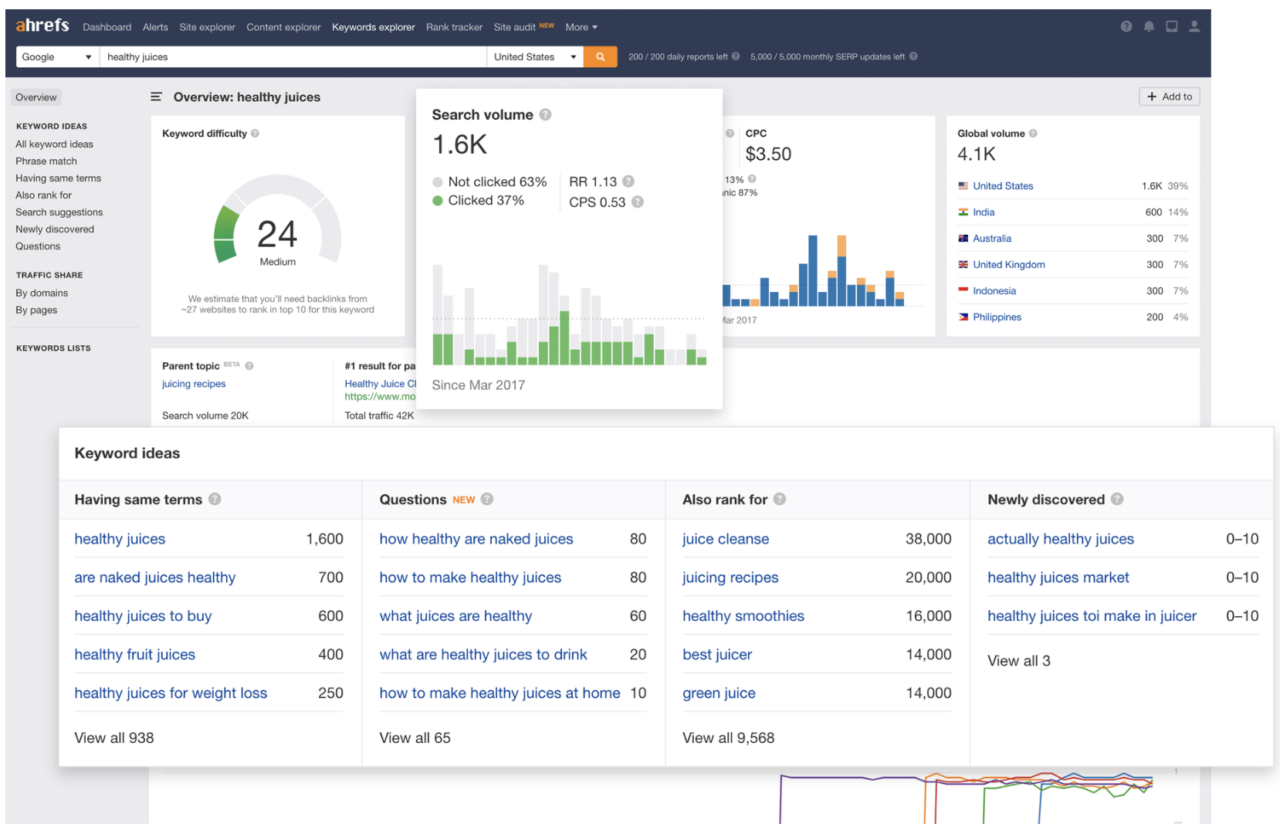
As you create lots of SEO-friendly guest posts for authoritative websites, your traffic will grow as your posts become highly visible in search results. Ultimately, it’s more important to write guest posts for people, but when you take the time to create SEO-friendly posts, it’s a big win for both the readers and your brand.
4) Include Backlinks
Adding backlinks is a crucial SEO aspect of any guest post. If a guest post is your elevator pitch to a potential new customer, the backlinks are the closer that may convince them to buy — or at the very least, become a regular reader of your blog.
You may only be allowed one or two of your own backlinks in total. So, with all that in mind, you should make sure to backlink to your most valuable blog posts that people will love.
In addition to backlinks, though, be sure to include a few internal links to the host site’s own blog. They’re going to do that anyway, and if you take the initiative of internally linking via some relevant anchor text, you’ll make them happy (and a little surprised).
Last Thoughts on Guest Posting Opportunities
Here’s the truth: One or two guest posts won’t transform your traffic. Don’t expect a byline on a couple of big websites to instantly turn you into a millionaire or renowned guru with 100,000 subscribers.
Guest blogging is a long-term strategy that requires significant time, patience, and top-notch writing skills. To succeed, you must approach it with clearly defined goals, unique guest post ideas, and a self-motivated attitude of wanting to offer valuable, actionable content to a wider audience.
Over time, with applied guest posting efforts and the right strategy, it can become a powerful force that’ll help you build a bigger audience. Ultimately, it enables you to establish your reputation online among your fellow bloggers and your audience. If you’re dedicated, it can drive your brand to new heights.
Additional content contributed by Sam Pak.




